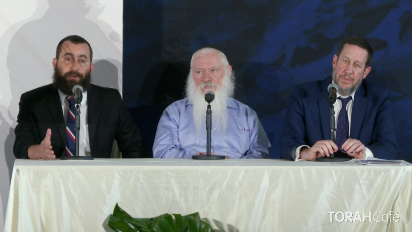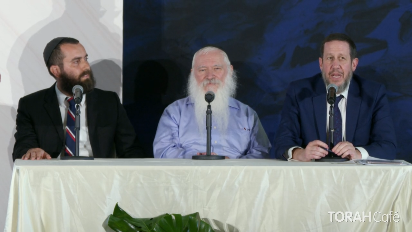-
Is Judaism Too Focused on Rituals? (2:37)
Is Judaism too focused on physical rituals at the expense of mindfulness and the inner experience? Why does a spiritual G-d care about physical deeds? For more "Crossfire" questions, go to: torahcafe.com/crossfire.
Series: Individual Crossfire questions
Rabbi Manis Friedman (248)
-
Do We All Get Repaid for the Charity We Give? (2:21)
When it comes to charity, we are allowed and even supposed to test G-d to see if he’ll reward us with riches for fulfilling this Mitzvah. So does every Jew who gives charity become rich? For more "Crossfire" questions, go to: torahcafe.com/crossfire.
Series: Individual Crossfire questions
Rabbi Manis Friedman (248)
-
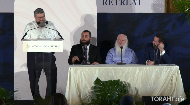 1:37
1:37
May I Sin till I'm Ready to Stop? (1:37)
My Rabbi advised me to go slowly and take baby steps on my path toward becoming Torah observant. Does this mean that I officially have permission not to keep a Mitzvah until I am ready for it? For more "Crossfire" questions, go to: torahcafe.com/crossfire.
Series: Individual Crossfire questions
Rabbi Pinchas Taylor (67)
-
 1:34
1:34
Why Is Wine Part of Many Religious Ceremonies? (1:34)
Rabbi Mendel Kalmenson (68)
-
 2:58
2:58
Why Are There Modesty Rule for Women but Not Men? (2:58)
While there are modesty rules for women, are there any for men? Plenty!.
Rabbi Mendel Kaplan (31)
-
 4:41
4:41
The Significance of Intent When Performing a Mitzvah (4:41)
What is the significance of having "Kavanah" (intent) when performing a Mitzvah?.
Rabbi Manis Friedman (248)
-
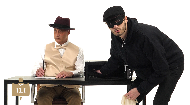 3:24
3:24
The Five Steps Of Teshuva (3:24)
Can wrongs be righted again? What must one do to achieve atonement and forgiveness for past transgressions? This video was produced for Lesson 2 of Beyond Right, a course by the Rohr Jewish Learning Institute.
Series: Beyond Right
-
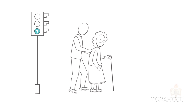 3:58
3:58
Judaism's 14 Mandatory Acts of Kindness (3:58)
Judaism doesn't view doing acts of kindness as voluntary, rather it instructs 14 mandatory acts of kindness. This video was produced for Lesson 6 of Well-Connected, a course by the Rosh Chodesh Society.
-
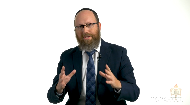 3:49
3:49
What Is the Significance of the Mourner's Kaddish? (3:49)
One would think that the deceased would be mentioned in the Mourner's Kaddish being recited in their memory. However, that is not the case. Why?.
Rabbi Mendy Gutnick (6)
-
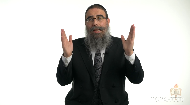 5:46
5:46
Do We Have 10 Commandments, or 613? (5:46)
How many commandments are there, ten or 613?.
Rabbi Shalom Paltiel (27)
-
 3:59
3:59
Why Is the Bible Written on Parchment? (3:59)
Why must the Bible be written on parchment, isn't paper good enough?.
Rabbi Moshe Krasnianski (10)
-
 3:45
3:45
The Importance of Burial in Judaism (3:45)
Why does Judaism put such great importance on burying our dead? After we pass on, of what use is our body? Rabbi Raleigh Resnick explains why Judaism holds burial sacred and why we go to great lengths not to let anyone be cremated.
Rabbi Raleigh Resnick (6)
-
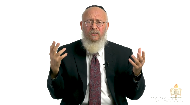 5:27
5:27
Why Do Jewish Men Wear a Kippah? (5:27)
Rabbi Chaim Block explains what is the significance of Jewish men wearing a head covering.
Rabbi Chaim Block (35)
-
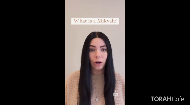 0:49
0:49
Everything You Need to Know About the Mikvah (0:49)
-
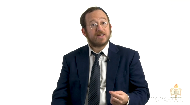 3:06
3:06
Judaism's Greatest Teaching (3:06)
Is it really so important to be regularly reminded of things you already believe in? What's the point?.
Rabbi Mendel Kalmenson (68)
-
 2:32
2:32
Why Wine Is a Part of Many Religious Ceremonies (2:32)
Rabbi Raleigh Resnick explains why wine is the drink of choice by important Jewish ceremonies.
Rabbi Raleigh Resnick (6)
-
 6:29
6:29
Who Authored the Grace After Meals (Birkat Hamazon) (6:29)
Have you ever wondered why we say Grace After Meals (Birkat Hamazon) and how it came to be? In this short and informative video, learn who composed the blessings we recite after having a meal and discover some fascinating facts and history along the way.
-
 48:28
48:28
The Gift of Jewish Giving (48:28)
Sharing an etymological root with tzedek (justice), tzedakah (charity) is a central Jewish ethic featured in many holidays and highlighted in the Talmud. Learn from Jewish philanthropists, as well as the founder of The Jewish Giving Pledge, why they give, where they give, and what they get. This panel was featured at the 15th annual National Jewish Retreat
Mr. Eyal Postelnik (1)
-
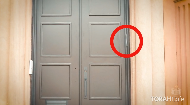 4:15
4:15
Why Do Jews Have This on Their Doors? (4:15)
Have you ever noticed an unidentified object affixed to the door of Jewish homes? Did you ever wonder if it is a religious item, or a special security system? Actually, it’s both!.
-
 6:08
6:08
What Is Charity? (6:08)
Series: Moment of Wisdom
Rabbi Shalom Paltiel (27)
-
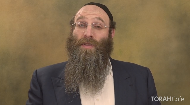 4:58
4:58
1. The Mitzvah of Honoring Parents (4:58)
Rabbi Levi Kaplan (54)
-
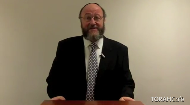 4:35
4:35
What is the Best Thing to Say to a Mourner? (4:35)
Perhaps the best thing is to say nothing, just be there. Rabbi Ephraim Mirvis recounts some possible bloopers to avoid saying to a mourner, and suggests some phrases that could be comforting or at least not distressing at this sensitive moment. Video Produced by United Synagogue see more videos on Ask the Rabbi and How To...
Chief Rabbi Ephraim Mirvis (3)
-
 45:06
45:06
The Healing Visit (45:06)
This lecture was delivered at the 7th annual National Jewish Retreat. For more information and to register for the next retreat, visit: Jretreat.com.
Rabbi Simeon Schreiber (1)
-
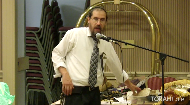 30:29
30:29
Making of a Sefer Torah, Tefillin and Mezuzot (30:29)
What makes a mezuzah unkosher? How can tefillin be fixed? Rabbi Hillel Baron explains using actual parchments and diagrams to clarify the laws.
Rabbi Hillel Baron (3)
-
 31:06
31:06
Taking Responsibility: A Mystical Perspective on Charity (31:06)
The money that we work for, to support ourselves and our families, can be permeated with spiritual power through giving charity. Rabbi Shmuel Lew, describing the letters by Rabbi Schneur Zalman of Liadi, published in the 4th section of Tanya, explains how giving charity and especially giving to charities in the Land of Israel, aligns our spiritual existence with the physcal
Rabbi Shmuel Lew (23)
-
 12:21
12:21
How to Make Tzitzit (12:21)
IMPORTANT: It has been brought to my attention that knotting together the 4 strings to keep them distinguishable isn't preferred, rather, to clip them with a paper clip or the like. Rabbi Levi Kaplan .
Rabbi Levi Kaplan (54)
-
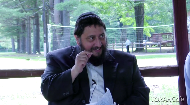 10:01
10:01
Laws of Mezuzah (10:01)
Rabbi Eli Silberstein (139)
-
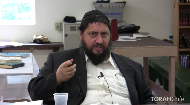 17:10
17:10
The Laws of Circumcision - Part 2 (17:10)
Series: The Laws of Circumcision
Rabbi Eli Silberstein (139)
-
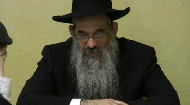 54:46
54:46
Laws Pertaining to the End of the Meal (54:46)
Series: Laws of Blessings (accompanying video)
Rabbi Berel Bell (151)
-
 57:58
57:58
Pas Habo BeKisnin: Filled, Coated or Crusted Doughs Part 2 (57:58)
Series: Laws of Blessings (accompanying video)
Rabbi Berel Bell (151)
-
 1:00:42
1:00:42
The Protective Power of the Mezuzah (1:00:42)
This lecture was delivered at the 6th annual National Jewish Retreat. For more information and to register for the next retreat, visit: Jretreat.com.
Rabbi Zalman Abraham (12)
-
 9:50
9:50
Jewish Life Cycle, Part 4: Upshernish (9:50)
Mrs. Leah Abraham (11)
-
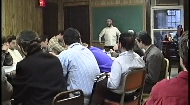 13:42
13:42
Laws of Tzitzit (13:42)
Rabbi Yaakov Goldberg (2)
-
 8:44
8:44
Jewish Life Cycle, Part 3: Redemption of the First Born (8:44)
Mrs. Leah Abraham (11)
-
 7:05
7:05
Jewish Life Cycle, Part 2: Circumcision (7:05)
Mrs. Leah Abraham (11)
-
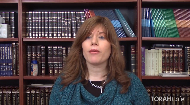 7:50
7:50
Jewish Life Cycle, Part 1: Pregnancy (7:50)
Mrs. Leah Abraham (11)
-
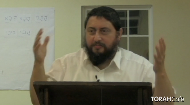 4:16
4:16
The Decision to Wear a Yarmulka (4:16)
Should I be taking on religious rituals that I don’t feel ready for? In this clip, Rabbi Eli Silberstein addresses this question by explaining the impact that your external behaviors have on you and how they can influence your future decisions.
Rabbi Eli Silberstein (139)
-
 9:55
9:55
Relationship With Your Parents During Your Jewish Journey (9:55)
In this clip, Rabbi Eli Silberstein addresses how to approach your relationship with parents while adapting a more religious lifestyle. He discusses the struggles that come up for many parents and how to see Judaism as a way to deepen your connection to your family.
Rabbi Eli Silberstein (139)
-
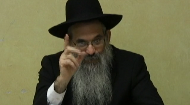 1:03
1:03
The Lubavitcher Rebbe's Tips for Safe Driving (1:03)
In this segment Rabbi Berel Bell, Dayan in Montreal, Canada, shares the directives of the Lubavitcher Rebbe regarding the objects one should keep in their car. Rabbi Bell shares the story of an individual who got in a car accident and the instruction he received from the Lubavitcher Rebbe in response to his letter.
Rabbi Berel Bell (151)
-
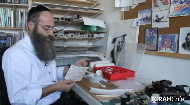 7:06
7:06
Jewish Scribal Art (7:06)
In addition to being an artist, Rabbi Moshe Braun practices safrut- Jewish Scribal Art.. In this fascinting, informative video, he takes viewers on a journey into the world of safrut. We learn about the different texts the sofer writes- Tefillin, Mezuzot, Torah Scrolls and Megillas, and Rabbi Moshe Braun shares all the little details that make up the wonderful world of Jewish scribal art.
Moshe Braun (4)
-
 2:49
2:49
30 Days of Mourning (2:49)
In this talk Rabbi Sholom Deitsch outlines the process of moving from the early mourning period, the shiva, to the 30 days, and then finally the eleven months. .
Rabbi Shalom Deitsch (2)
-
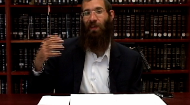 11:42
11:42
Charity Today (11:42)
Rabbi Velvel Lipsker (5)
-
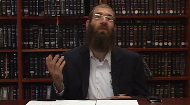 13:24
13:24
The Mitzvah of Tzedakah - Segment 2 (13:24)
Rabbi Velvel Lipsker (5)
-
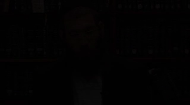 9:37
9:37
The Mitzvah of Tzedakah - Segment 1 (9:37)
Rabbi Velvel Lipsker (5)
-
 58:16
58:16
The Laws of Washing Hands in the Morning (58:16)
Rabbi Bell reviews the spiritual significance of, and procedure for, washing ones' hands in the morning.
Rabbi Berel Bell (151)
-
 7:44
7:44
Level of Mitzvah Observance (7:44)
This class took place at the Ivy League Torah Study Experience (ILTSE), a summer Torah-learning program provided by the National Committee for the Furtherance of Jewish Education. ILTSE is open to college-age and graduate students with minimal or no background in Torah learning
Rabbi Sholom Ber Hecht (1)
-
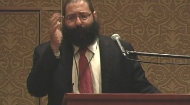 56:04
56:04
Tefillin: Decoding Black Boxes (56:04)
Discover the profound mystical dimensions of tefilin. You have a brain. It is in one world. Your heart is in another. And your hands often end up involved in something completely foreign to both of them: three diverse machines. So you put on tefilin
Rabbi YY Jacobson (103)
-
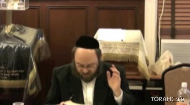 1:05:04
1:05:04
Laws of Conversion- Part 1 (1:05:04)
Kollel Yom Rishon is an open lecture series which can be attended every Sunday morning, 11:15 A.M, at Beis Menachem Mendel, 1703 Avenue J, Brooklyn, NY. Rabbi Yochanan Marsow serves as rabbi and spiritual leader of Beis Menachem Mendel in Flatbush, New York. He gives daily lectures on topics encompassing the entire gamut of Talmudic law and Chassidic philosophy
Rabbi Yochanan Marsow (14)
-
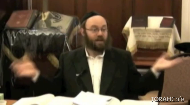 40:16
40:16
Laws of Conversion - Part 2 (40:16)
"Kollel Yom Rishon" is an open lecture which can be attended every Sunday morning, 11:15 A.M, at Beis Menachem Mendel, 1703 Avenue J, Brooklyn, NY. Rabbi Yochanan Marsow serves as rabbi and spiritual leader of Beis Menachem Mendel in Flatbush, New York
Rabbi Yochanan Marsow (14)
-
 1:42
1:42
Rabbinic Enactments (1:42)
This class took place at the Ivy League Torah Study Experience (ILTSE), a summer Torah-learning program provided by the National Committee for the Furtherance of Jewish Education. ILTSE is open to college-age and graduate students with minimal or no background in Torah learning
Rabbi Dr. Alter Metzger (15)
-
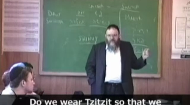 2:05
2:05
The Mitzvah of Tzitzit (2:05)
This class took place at the Ivy League Torah Study Experience (ILTSE), a summer Torah-learning program provided by the National Committee for the Furtherance of Jewish Education. ILTSE is open to college-age and graduate students with minimal or no background in Torah learning
Rabbi Dr. Alter Metzger (15)
-
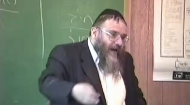 1:40
1:40
Kiddush Hashem (1:40)
This class took place at the Ivy League Torah Study Experience (ILTSE), a summer Torah-learning program provided by the National Committee for the Furtherance of Jewish Education. ILTSE is open to college-age and graduate students with minimal or no background in Torah learning
Rabbi Dr. Alter Metzger (15)
-
 0:57
0:57
Blessing the New Month (0:57)
This class took place at the Ivy League Torah Study Experience (ILTSE), a summer Torah-learning program provided by the National Committee for the Furtherance of Jewish Education. ILTSE is open to college-age and graduate students with minimal or no background in Torah learning
Rabbi Dr. Alter Metzger (15)
-
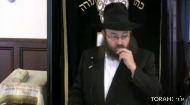 1:17:18
1:17:18
Agunah - Part 2 (1:17:18)
"Kollel Yom Rishon" is an open lecture series which can be attended on every Sunday morning, 11:15 A.M, at Beis Menachem Mendel, 1703 Avenue J, Brooklyn, NY. Rabbi Yochanan Marsow serves as rabbi and spiritual leader of Beis Menachem Mendel in Flatbush, New York
Rabbi Yochanan Marsow (14)
-
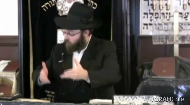 1:09:47
1:09:47
Agunah - Part 1 (1:09:47)
Kollel Yom Rishon is an open lecture which can be attended every Sunday morning, 11:15 A.M, at Beis Menachem Mendel, 1703 Avenue J, Brooklyn, NY. Rabbi Yochanan Marsow serves as rabbi and spiritual leader of Beis Menachem Mendel in Flatbush, New York. He gives daily lectures on topics encompassing the entire gamut of Talmudic law and Chassidic philosophy.
Rabbi Yochanan Marsow (14)
-
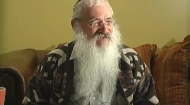 7:13
7:13
G-dly Communication (7:13)
This video is part of a Question & Answer session given by Rabbi Manis Friedman to girls and women in Crown Heights, NY hosted by Bais Chana Women International (www.baischana.org). Rabbi Friedman is a world-renowned author, counselor, lecturer and philosopher. For books, classes and insight by Rabbi Friedman, check out: www.ItsGoodToKnow.com.
Rabbi Manis Friedman (248)
-
 31:10
31:10
Quill and Ink: A Hands-on Exploration of the Jewish Scribal Arts (31:10)
Rabbi Moshe Grossbaum (1)
-
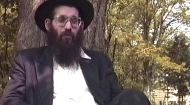 7:57
7:57
Family Purity in a Modern Age (7:57)
Vintage This class took place at the Ivy League Torah Study Experience (ILTSE) - a summer Torah-learning program provided by the National Committee for the Furtherance of Jewish Education. ILTSE is open to college-age and graduate students with minimal or no background in Torah learning
Rabbi Berel Bell (151)
-
 1:04:29
1:04:29
Kesubos (1:04:29)
"Kollel Yom Rishon" is an open lecture series which can be attended every Sunday morning, 11:15 A.M, at Beis Menachem Mendel, 1703 Avenue J, Brooklyn, NY. Rabbi Yochanan Marsow serves as rabbi and spiritual leader of Beis Menachem Mendel in Flatbush, New York.
Rabbi Yochanan Marsow (14)
-
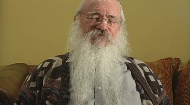 10:42
10:42
Forbidden Lifestyles (10:42)
Rabbi Manis Friedman (248)
-
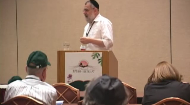 52:36
52:36
A Journey through the World of Prayer (52:36)
Discover and understand why the early Talmudic sages and Chassidic masters spent most of their day engaged in prayer, and what it meant for the rest of the community. An in depth study of the meaning, components and structure of the daily and Shabbat prayers. This lecture was delivered at the 2th annual National Jewish Retreat
Rabbi Shmuel Kaplan (18)
-
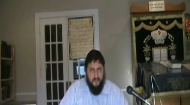 42:21
42:21
Teshuva Part 2: Transgressions of Rabbinic Law (42:21)
There are many mitzvot that we do that are not written in the Torah; they were established by the Rabbis. Does transgressing a Rabbinic law carry the same weight as transgressing a Torah law? Is the process of teshuva-repentance- the same in both cases? Rabbi Eli Silberstein has the answers.
Series: Judaism Decoded Lesson 3
Rabbi Eli Silberstein (139)
-
 31:07
31:07
Teshuva Part 1: Accidental Transgressions (31:07)
We've all experienced that "uh-oh" moment, when we realize we accidentally did something wrong. Is there a way in Judaism to atone for such a thing? Rabbi Eli Silberstein explains the concepts, practices and importance of teshuvah- repentance. .
Rabbi Eli Silberstein (139)
-
 1:16:02
1:16:02
Dynamics of Prayer (1:16:02)
Once upon a busy life — maybe even two or three times, or more — we are struck with a sense of being so small within something much larger. Wouldn’t it be good for the two of us to have a chat? We would like to speak with G-d
Rabbi Dr. J. Immanuel Schochet (34)
-
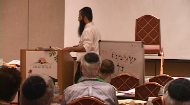 58:02
58:02
The Fascinating World of Scribal Arts (58:02)
Ever since Moses scribed the first Torah Scroll some 3,300 years ago, a very precise tradition has been handed down from generation to generation as to how the letters of our Sefer Torahs, Tefilin and Mezuzot are to be inked on parchment. In addition to being a sacred mitzvah, this fine process has helped ensure the preservation and authenticity of our original texts throughout the millennia
Rabbi Moshe Eliezer Liberow (1)
-
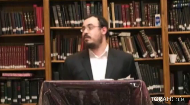 49:47
49:47
Blessing the Sun - History and Background (49:47)
Birkat Hachama (ברכת החמה, "Blessing of the Sun") refers to an exceedingly rare blessing that is recited to the Creator, thanking Him for creating the sun. The blessing is recited when the sun completes its cycle every 28 years on a Tuesday at sundown
Rabbi Zalman Abraham (12)


